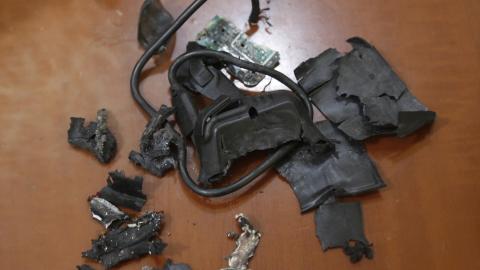On September 17, thousands of Hezbollah operatives’ pagers exploded, killing at least 10 and injuring many more. Below is Senior Fellow Michael Doran’s analysis of this unprecedented attack, which he named Operation Grim Beeper.
Operational Complexity
This is one of the most astonishing intelligence operations in history. It is a reworking of the story of the Trojan Horse for the digital age, and it deserves to become nearly as legendary as its iconic predecessor. If we are not utterly astounded, it is because we have seen too many James Bond and Black Mirror movies for our own good. In real life, operations like this just don’t happen. It is at least four operations in one.
First, the Israelis thoroughly mapped Hezbollah’s supply chain.
Second, they invented a special explosive charge small enough to be inserted inside a handheld device, sophisticated enough to be remotely activated, big enough to do real harm, and yet not so prominent, physically or electronically, to call attention to itself.
Third, the Israelis turned themselves into a big enough link in Hezbollah’s procurement network to take physical control of the devices and rig them.
Fourth, they activated the charges simultaneously and across a very wide geographic area.
If any one of these sub-operations had been botched, the operation as a whole would have fizzled. Who else in the world could pull off such an imaginative, technically sophisticated, and audacious plot?
Precise Targeting and Unprecedented Success
Operation Grim Beeper is the first mass targeted killing in history. Each of the thousands of people killed or maimed was selected individually and hit at the same moment. The great genius of the operation is that the Israelis relied on Hezbollah itself to select their targets for them. I can’t think of another case like this where the attackers sat back and let the enemy perform a key part of their work for them. If we map the attacked men, we map Hezbollah’s organizational chart—including the blinded Iranian ambassador to Lebanon, who is an Islamic Revolutionary Guard Corps officer.
The large ratio of maimings to deaths is a success. In military terms, a maiming is preferable to a death because it ties up more resources and stresses enemy systems to a much greater degree.
Israel’s mass targeted killing also foiled Hezbollah’s human shield tactics. Whereas Israel places itself between its enemies and its public, Hezbollah, like Hamas, places the public between it and the Israel Defense Forces. These terror groups are secure in the knowledge that confused or corrupt Westerners will blame civilian deaths not on the terrorists but on Israel.
To be sure, useful idiots like Josep Borrell, the vice president of the European Commission, will never hesitate to reward Hezbollah for its human shield policy. These misguided individuals will reflexively bleat condemnation of Israel and accuse it of indiscriminately killing innocents. But the thinking observer can see clearly that these are clean kills—as clean as one can possibly imagine in war.
Political Implications of the Operation
Operation Grim Beeper was not only conducted within the very narrow rules of war that are imposed on Israel but on no one else, but it is also morally laudable. Hezbollah is a terrorist organization. It is an arm of Iran, a terrorist state whose rise across the Arab world has brought death and destruction everywhere it has gained a foothold.
Hezbollah worked hand in glove with Russia, Iran, and the Assad regime to flatten large parts of many of the major cities of Syria. Iran and Hezbollah cannot be appeased; they must be deterred. Unfortunately, the Biden administration believes that diplomacy and military deterrence are separate activities, and that diplomacy is morally superior. The administration reflexively admonished Israel for Operation Grim Beeper and repeated its pious mantra, de-escalation.
But pressure on Israel to de-escalate only advances Iran’s and Hezbollah’s agendas. It was these two actors who escalated on October 8, when Hezbollah opened fire, unprovoked, on Israel. That escalation was not designed to help Gazans get a two-state solution. It sought to (a) weaken the American alliance system, (b) strengthen Iran’s corridor to the Mediterranean, and (c) safeguard the Iranian nuclear weapons program.
The only de-escalation that the United States should support is the one that will return Israeli civilians to their homes and weaken Hezbollah’s death grip on southern Lebanon. Diplomacy designed to achieve that kind of de-escalation requires military deterrence. Operation Grim Beeper is the beginning of the Israeli effort to restore deterrence.
Moving Forward
Operation Grim Beeper very likely sowed mistrust between Beirut and Tehran. It quite obviously did enormous psychological damage to Hezbollah by creating confusion in the ranks, disrupting basic communications systems, and leaving everyone from top to bottom in the organization feeling exposed and wondering what Israel will pull on them tomorrow.
But if those pagers came through Iran, as a number of press reports have claimed, then Operation Grim Beeper will also have planted doubt in the Lebanese mind about the reliability of Iranian systems. Many Israeli intelligence operations, including the recent killing of Hamas leader Ismail Haniyeh, have demonstrated that Mossad has thoroughly penetrated Iran. That penetration has now obviously become a threat to Hezbollah, which has to wonder if it can trust anything manufactured or procured by Iran.














